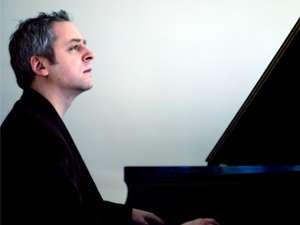|
Back
The Art of the Piano New York
Isaac Stern Auditorium, Carnegie Hall
03/22/2013 -
Béla Bartók: Piano Sonata, sz. 80
Franz Liszt: Variations on "Weinen, Klagen, Sorgen, Zagen", S. 179 – Années de pèlerinage (Deuxième année): Sonetto del Petrarca No. 123 & Après une lecture de Dante (Fantasia quasi sonata)
Richard Wagner: Isoldes Liebestod (arr. Liszt)
Johann Sebastian Bach: The Well-Tempered Clavier (Book I): Prelude and Fugue in B Minor, BWV 869
Ludwig van Beethoven: Piano Sonata No. 32 in C Minor, Op. 111
Jeremy Denk (Piano) 
J. Denk (© Samantha West)
Obviously, Jeremy Denk is a man obsessed, if not possessed. Not obsessed with Beethoven’s C Minor Piano Sonata which he has performed here three times in two years (2011 & 2012). But obsessed with offering the most sizzling, dazzling recitals imaginable.
He is certainly not possessed (except with extraordinary talents as musician, writer and now librettist). Nor is he given to Scriabin-like numinous aurae oscillating above his notes. Rather, with the most eclectic programs, Mr. Denk gives his maximum effort to make every single work resonate, and become (mostly) a coalescence of era and personal joy.
Is this still young talent apt to coat the music with a romantic emotion? Well, yes, but that goes with the show. He played the thirteenth Goldberg Variations with a Chopinesque flair that would have made Glenn Gould shudder. But it worked. He played the final Bach Prelude and Fugue from the Well-Tempered Clavier with more solid introspection, but one suspected he wanted to take that “walking” theme and run an emotional mile with it, such was the concealed energy, an energy put to good use in the following fugue.
Nor is Mr. Denk stolid and sober in his physical movements. He can sway and raise a hand dramatically when needed. But in his case this doesn’t seem so much showmanship as that pure emotional feeling.
The recital had a strange balance. The first half was devoted to Hungary, though no two composers could be more dissimilar than Bartók and Liszt. The second half was German, though Mr. Kemp, in his evocative program notes, tied them together not in nationality, but the “finality” of the compositions.
Nor was Mr. Denk exactly orthodox in the order of the recital. To begin with the Bartók Piano Sonata, he could have jolted the audience with percussive, dancing rhythms. But Jeremy Denk is too much the musician to merely make an effect. Yes, that opening movement did have a volcanic movement, but it was played with care and, above all, the color which the composer needed. The second movement was indeed the composer possessed. And Mr. Denk knew enough to make the most subtle tone colors on one note, the dissonances playing around those notes like demons. The finale showed Mr. Denk always in control of those whirling rhythms, those sheets of notes tearing down the piano.
Following that with the rarely heard Liszt "Weinen, Klagen, Sorgen, Zagen" Variations for a dynamic change. The work starts with a descending Bach theme, and almost immediately takes on Liszt’s vestments, highly romantic, with hints of the Baroque, a piece keeping one on edge. Unlike the final Liszt Liebestod transcription (what one could call the “cover’ rendition) this was a more subtle, mysterious work. The way it was played here it was Bach channeled through Liszt channeled through, yes, Mr. Kemp himself.
The Liszt “Petrarch” work was a dreamy poem. The second, showing the hell, purgatory and heaven of Dante, was Mr. Denk at his uninhibited best. The piece never clamored, never yelled its emotions. Rather, Mr. Denk produced a poetry which overflooded Dante’s words and became, again, Franz Liszt the channeler of the supernatural.
I have heard Mr. Denk do the Beethoven C Minor three times now. He is either madly in love with the music, or he is trying to get it exactly perfect. It was, again, done with a poetry–especially in the Arietta variations–that left one with two emotions. One was that such a recital was sufficient. No more notes should be heard. The other was greed, to listen even more.
By taking that quiet “Goldberg” variation and later one of the most introspective piano pieces, Mr. Denk satisfied both desires. His recital was a blessing for the piano. The encores became his deeply felt amen.
Harry Rolnick
|